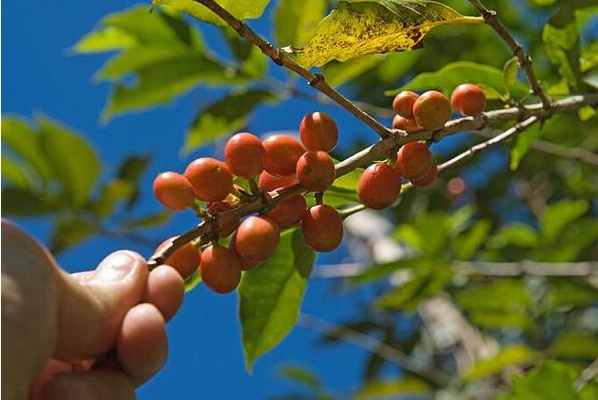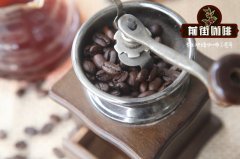Change the flavor of coffee with different roasting degree, choose the flavor curve of your favorite coffee.
Professional coffee knowledge exchange more coffee bean information please follow the coffee workshop (Wechat official account cafe_style)

Coffee roasting process
In the process of roasting coffee beans, as the roasting time lengthens, coffee beans will go through ten processes. By understanding the process, we can better understand the correlation between coffee flavor and it.
Green raw bean stage
When you start baking, the temperature rises slowly, and the coffee remains light green, which is not suitable for drinking.
Yellow dehydration stage
With the increase of roasting time, the color of coffee slowly changes to light yellow, with the aroma of grass, but the coffee beans at this stage are still not suitable for drinking.
Fueling stage
The water in the coffee beans began to evaporate, producing water vapor.
Primary explosion stage
At this point, you will hear a crisp popping sound. The sugar content of coffee is about to begin caramelization, which is usually used in cup testing.
Light baking stage
At the beginning of the explosion, the coffee beans were in a light baking state. What we generally call shallow culture is this time, and the coffee beans at this stage are already suitable for drinking.
Moderate baking stage
After a caramel reaction of about degrees Celsius, the oil begins to ooze, the beans begin to swell, and the coffee is in a medium culture state.
Middle and deep cultivation stage
Between moderate roasting and second explosion, the taste of coffee is almost sour, and the concentration will be more intense, which is generally called medium-deep culture.
Second explosion stage
The second popping sound is louder than the first one. At this time, the coffee is in a state of deep roasting, which is generally called deep culture.
French baking stage
The color of the coffee has become very dark and close to black, the sugar is exhausted, it begins to smoke, and the structure in the bean body disintegrates, which is called French roasting.
Coke burning stage
Coffee beans have been completely burnt, can not drink any coffee flavor, can no longer drink.
Introduction of coffee flavor
There are many coffee producing areas, even different estates, and most of them fall into the so-called coffee belt, because there are many environmental and climatic restrictions on growing Arabica coffee, and therefore, Arabica coffee is sensitive to climate. Different varieties, the same varieties will produce different flavors of coffee in different environments and climatic conditions.
If you like nutty cocoa,
Try coffee beans from Sumatra, Panama, Colombia, Brazil, Jamaica, Puerto Rico and Dominica.
If you like fruit flavor
Consider coffee from Kenya, Tanzania and Ethiopia.
If you like the sweet and sour smell of flowers
Consider coffee from Guatemala and Honduras.
Introduction of treatment method
Coffee cherry is composed of exocarp, pulp, pectin layer, endocarp, silver peel and coffee germ from outside to inside, so coffee beans will be treated by various methods before they are turned into raw beans for export.
Different treatments can create different flavors of coffee, which occupies a very important part of coffee flavor.
Important Notice :
前街咖啡 FrontStreet Coffee has moved to new addredd:
FrontStreet Coffee Address: 315,Donghua East Road,GuangZhou
Tel:020 38364473
- Prev

Change the flavor of coffee with different roasting degree, choose the flavor curve of your favorite coffee.
Professional coffee knowledge exchange more coffee bean information Please follow the coffee workshop (Wechat official account cafe_style) Coffee roasting process of roasting coffee beans with the increase of roasting time, coffee beans will go through ten processes, through the understanding of the process can better understand the correlation between coffee flavor and it. The green bean stage begins to bake, the temperature rises slowly, and the coffee remains light green.
- Next

There are several common cutters in bean grinders. What's the difference between them?
The advantages and disadvantages of the flat knife: the flat knife grinder is composed of the upper and lower cutter heads, and the base is fixed on the motor. When the motor starts, it rotates the upper and lower cutter heads to produce cutting action. When the coffee particles fall from the middle, the knife head rotating at the bottom will spin the coffee beans to the outside and push the coffee beans into the tooth cutter part for grinding. The upper and lower cutters of the flat knife are placed in parallel, so the coffee beans need to rely on
Related
- Beginners will see the "Coffee pull flower" guide!
- What is the difference between ice blog purified milk and ordinary milk coffee?
- Why is the Philippines the largest producer of crops in Liberia?
- For coffee extraction, should the fine powder be retained?
- How does extracted espresso fill pressed powder? How much strength does it take to press the powder?
- How to make jasmine cold extract coffee? Is the jasmine + latte good?
- Will this little toy really make the coffee taste better? How does Lily Drip affect coffee extraction?
- Will the action of slapping the filter cup also affect coffee extraction?
- What's the difference between powder-to-water ratio and powder-to-liquid ratio?
- What is the Ethiopian local species? What does it have to do with Heirloom native species?

